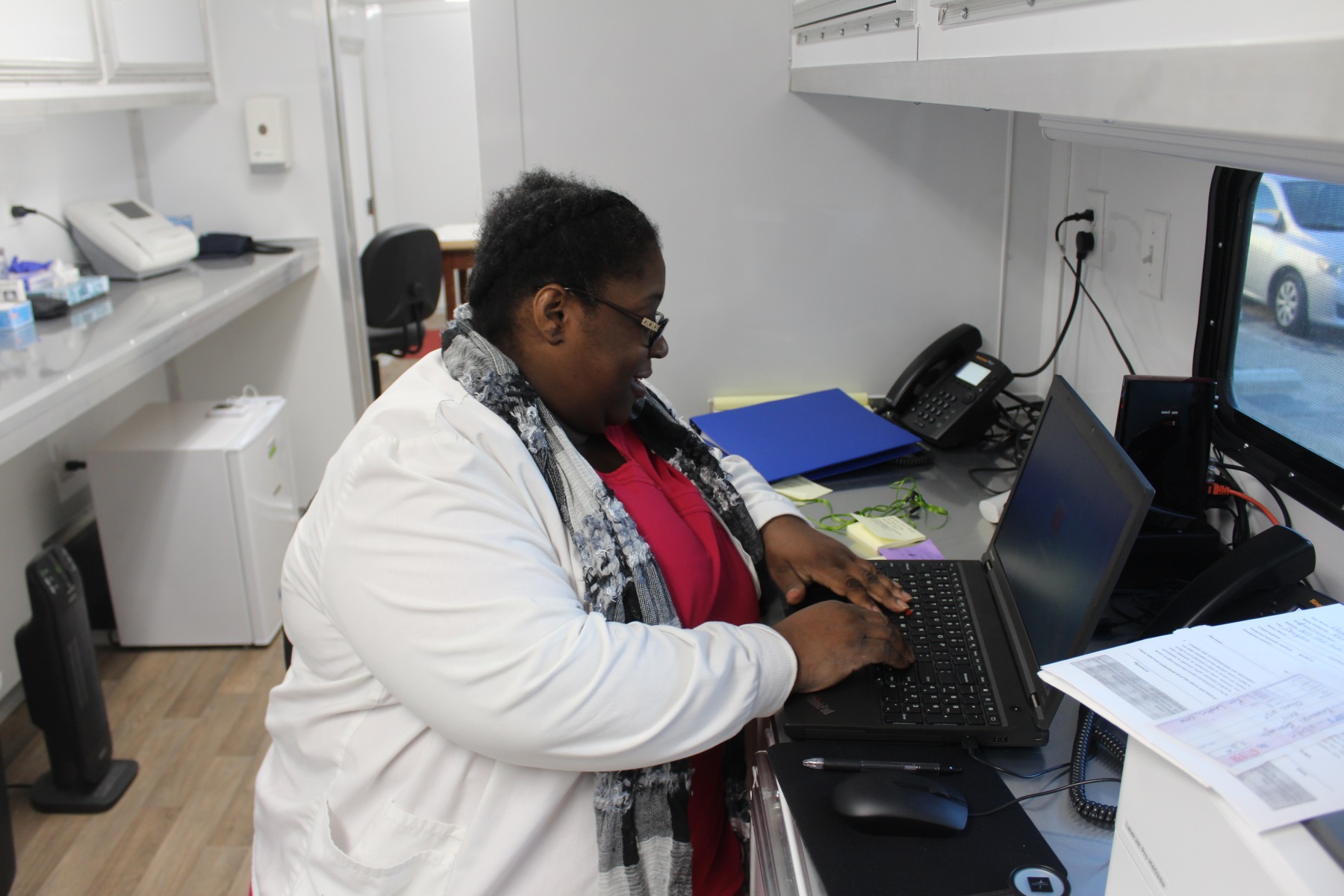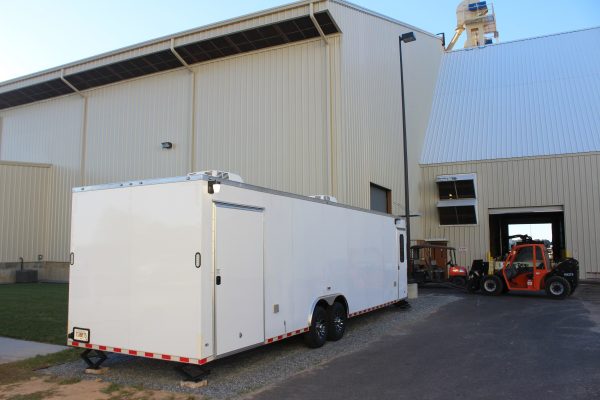Rural Ga. Businesses Increasingly Prop Up Struggling Health Care System

On most weekday mornings, Kimberly Landers, a medical assistant with Coffee Regional Medical Center, sees patients in the clinic at the Premium Peanut shelling plant.
Johnny Kauffman / WABE
In the middle of rural South Georgia, the sun is just coming up on two tan-colored warehouses at the 3-and-half-acre Premium Peanut shelling plant.
Among the conveyors and trucks carrying peanuts, there’s an enclosed, white trailer about the size you might see on a campground. On weekday mornings, around the time workers at Premium Peanut change shifts, Kimberly Landers enters the trailer, opens her laptop and gets ready to see patients.
This is a health clinic with an exam room, refrigerator, bathroom, some chairs and lots of cabinets for supplies. Without scheduling an appointment, Premium Peanut employees, their families, as well as the farmers who send their peanuts to the shelling plant can stop in for checkups.
“Everything that you need is here,” said Landers, a medical assistant with Coffee Regional Medical Center, which operates the clinic. “That way you don’t have to take off time to go to the doctor because we’ve brought the doctor here to see you.”
It’s not new for a business to set up a health clinic for its employees. In 2015, a survey by benefits consultant Mercer found nearly 30 percent of companies with more than 5,000 workers have on-site or near-site clinics offering primary care.
In October, soon after Premium Peanut’s clinic opened, the company had 207 employees.
Even with such a relatively small workforce, company executives said they had little choice but to open the clinic in order to remain profitable in the economically depressed part of the country where qualified manufacturing workers are difficult to hire and retain.
Premium Peanut is just one example of how a shortage of physicians and primary care facilities, along with the threat of hospitals closing, is driving Georgia businesses to get more involved in the health care industry beyond just paying for employee insurance.
Georgia lawmakers have fueled the trend through a less than 2-year-old program allowing individuals and corporations who donate directly to rural hospitals to write off 90 percent of their donation when completing their state taxes.
“If you lose that access to health care in a rural community, those businesses cannot grow. Period,” said former Georgia Rep. Geoff Duncan, a primary sponsor of legislation creating the rural hospital tax credit program.
“Businesses want to be engaged in trying to solve those problems,” he said.
Kidney Stones And High Blood Pressure

At the beginning of his shift one day in late October, Premium Peanut employee Ronnie Myers visited the on-site clinic.
“Just a little sinus infection coming on. Trying to catch it early enough so I don’t miss any more work,” Myers said. “I’m not allowed to miss work this time of year.”
It was the middle of the peanut harvest, and Myers leads a team that handles quality control for Premium Peanut.
“I’ve been through peanut seasons with kidney stones and waited until after peanut season to go get a kidney stone seen about. You just don’t leave work during peanut season,” Myers said, laughing and grimacing from the memory.
Myers’ bosses said they weren’t happy with him when they learned he’d been self-treating the kidney stones.
His strategy: “Just wait it out, drink a lot of water, drink a few beers at night when you get home and, hopefully, flush them out.”
Myers was fine in the end, but he probably won’t let a health issue go that long again without getting it checked out.
He said he’ll keep visiting the clinic at Premium Peanut because it’s convenient.
When the medical assistant Landers is at the clinic, patients can walk in for an unscheduled checkup, diabetes test, flu swab and more. They’re supposed to pay $10 for each visit, which goes to Coffee Regional.
Kidney stones are a more painful and acute issue than what Landers expects to encounter as employees come in for checkups.
“We had one patient who thought he had a sinus infection, but it ended up he was having problems with his blood pressure,” Landers said. “He could have had a stroke. He could have passed out.”
Now, Landers said, that patient is on medicine, and his blood pressure has come down.
A lot of people in the community have trouble finding time to see the doctor, Landers said.
Not Enough Physicians, Not Enough Care

A 2016 report published by Coffee Regional Medical Center said the area is short 31 physicians.
Executives at Premium Peanut said they have first-hand experience of that physician shortage, whether it’s waiting an hour for a single injection or difficulty scheduling an appointment.
Lee Taylor, a vice president at Premium Peanut, hopes the on-site clinic will address some of those issues for the company’s workers.
“If you sit around and do nothing, nothing ever changes. It gets worse. We have problems in the rural areas of this state,” he said. “This is one step to solving those problems.”
It’s hard to find and retain workers in the rural South, Taylor said, and if they get sick, have a long trip to the doctor or spend hours waiting for an appointment, it all slows down the shelling plant and threatens its profitability.
“This keeps our productivity levels up. Keeps us away from downtime or having to call in temps to fill key positions,” Taylor said.
Many of Premium Peanut’s employees are Spanish speakers, according to Taylor. Typically, either the nurse practitioner or the medical assistant working at the clinic is bilingual, knocking down another barrier to getting a checkup for many of the shelling plant’s employees.
Premium Peanut’s CEO recently told Georgia lawmakers the company pays Coffee Regional about $70,000 a year to operate the clinic.
Neither the hospital nor the shelling plant expect to make an immediate profit from the clinic.
“It’s much less expensive for us to do a clinic staffed by a nurse practitioner and a medical assistant than it is for folks to come into our ER,” Vicki Lewis, the hospital’s CEO, said.
Lewis said she wasn’t sure why Premium Peanut’s executives encountered long lines or scheduling issues, noting Coffee Regional has a walk-in clinic that’s open 12 hours a day, seven days a week.
“Every community, and Coffee County is no different, can always use more primary care providers, and so we are trying very hard to increase the number of family practitioners, pediatricians, internal medicine physicians,” said Lewis.
Since the clinic opened at Premium Peanut, Lewis said other employers in the area have asked about setting up a similar clinic.
The president of the Georgia Association of Manufacturers, Roy Bowen, said he’s seen increased interest in on-site clinics from companies in rural areas all over the state.
“There’s even cases where smaller employers will get together and jointly sponsor a clinic that may cover multiple employers,” Bowen said. “I think everyone that I’ve come across would love to have it. It’s a matter of scale and whether you can afford it.”
Georgia lawmakers are interested in somehow encouraging more businesses to set up their own clinics.
They’ve already set up a program to support the state’s rural hospitals by giving tax breaks to individuals and businesses that give the hospitals money.
‘One Arrow In The Quiver’
Six rural hospitals in Georgia have closed since 2010.
“The problem with the small, rural hospitals is that they are extremely operations-cash starved,” said Jimmy Lewis, CEO of Hometown Health, a network of rural hospitals.
Many people admitted to rural hospitals either don’t have insurance, which means the hospital may never be directly paid for the care it provides. And many people admitted are covered by Medicaid, which means the hospital is reimbursed for about 86 percent of its costs.
For the only hospital in Dodge County, about two hours south on Interstate 75, 7 percent of people admitted don’t have insurance, and 28 percent are covered by Medicaid, according to a 2015 report.
“We are losing money on Medicaid,” said Dodge County Hospital CEO Kevin Bierschenk.
Dodge County Hospital is the only facility within 30 miles that provides obstetric and gynecological care for women, but Bierschenk said, short term, it doesn’t make a profit.
The hospital is directing the $170,000 it’s received in donations to cover the costs.
“This is by no means the silver bullet,” Lewis said. “This is one arrow in the quiver to help them on a survival basis.”
According to the Georgia Department of Revenue, in November, only $7.7 million of an available $60 million in tax-deductible donations has been claimed for the current fiscal year ending in June.
Lewis said state lawmakers need to tweak the program so donors get not just 90 percent, but all of their money back.
He said that will lead more people to donate and help keep rural hospitals alive.
Available Government Funds
Georgia is one of 18 states that did not expand Medicaid coverage for low-income adults under the Affordable Care Act, or Obamacare.
It means the state has foregone about $12.5 billion in federal dollars through 2017, according to Georgia State University Institute of Health professor Bill Custer.
About 240,000 Georgians fall in what’s called a “coverage gap,” meaning they don’t qualify for Medicaid and they don’t qualify for subsidies to help with the cost of insurance on Obamacare exchanges.
The cost of caring for people without insurance who visit hospitals is one big reason they’re struggling financially, according to Laura Harker, a health policy analyst with the Georgia Budget and Policy Institute.
“Increasing coverage is really important, especially in those rural areas that already had high uninsured rates,” said Harker.
In Georgia, rural county governments and businesses are being asked to contribute more and more money to the local health care system, even as the economies and tax revenues in those same areas are shrinking, Harker said.
“That’s why you’ve seen some counties looking to increase their taxes to help support their hospital and keep it open,” she said.
For businesses, contributing to the local health care system isn’t just about productivity, said Premium Peanut’s Lee Taylor.
The company wants to be seen as doing good in the community; plus an on-site clinic and a good local health care system keep employees loyal and serve as an important recruiting tool.
Taylor said Premium Peanut can’t wait for the government to fix rural Georgia’s health care access problems.
“Other companies should do it if they want to remain successful,” said Taylor, “those that don’t change, will die.”
Elly Yu contributed to this story.





